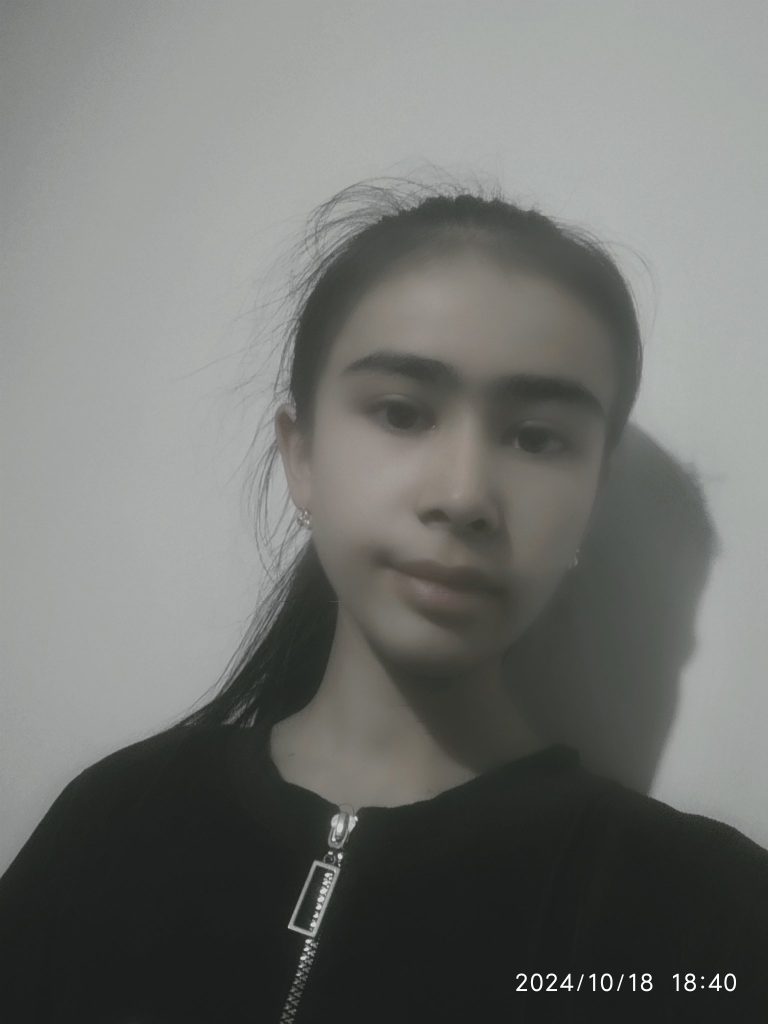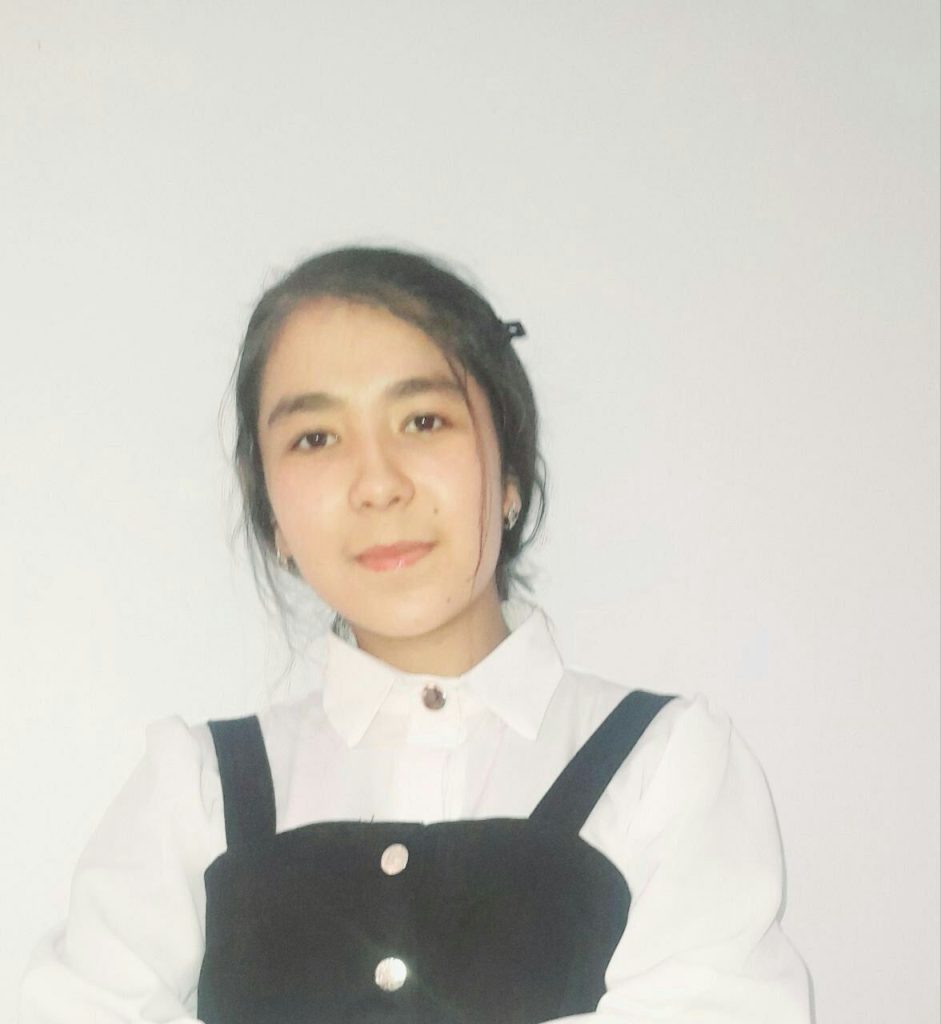Differences in Sentence Structure between Uzbek and French
Xurramova Farangiz Xoshimjon qizi
1 st- year student of the Faculty of Roman-German Philology, Samarkand
State Institute of Foreign Languages
Abstract: French and Uzbek belong to different language families, and their sentence structures differ significantly. Uzbek is an agglutinative language (words are formed through affixes ), whereas French is a fusional language (word forms change depending on grammatical function). This article provides a comparative analysis of sentence structures in these two languages, focusing on word order , the role of the verb, syntactic structure and methods of sentence connection. In Uzbek, the standard word order follows the SOV (Subject – Object- Verb ) structure, whereas in French, it follows the SVO (Subject – Verb- Object) structure. Additionally, verb tenses and subject agreement in Uzbek are indicated through affixes, while in French , verb conjugation plays are crucial role. This article also examines sentence formation in both languages and their influence on the learning process of Uzbek and French.
Keywords: Language family, group, connection, methods, affixes, sentence components, French, Uzbek, subject, predicate, main parts, verb.
Language are classified into families based on their origin, structure and certain lexical and grammatical features. Each languages family consists of multiple languages, which are further divided into branches or subgroups based on their similarity. The degree of similarity among languages varies within these subgroups. For example, the Turkic language family includes Uzbek, Uighur, Kyrgyz, Kazakh, Tuvan, Tatar, Bashkir, Turkmen, Azerbaijani, Turkish, Gagauz and Chuvash, among others, making up over 20 languages. French, on the other hand, belongs to the Romance subgroup of the Indo-European language family.
Word Formation in Uzbek and French:
In Uzbek, words are formed using two primary methods:
1.Affixation (Morphological method) – new words are created using derivational affixes.
Examples:
kitob + xon > kitobxon ( reader)
yosh + lar > yoshlar ( youth)
2.Composition (Compounding method)- new words are formed by combining two or more words.
Examples:
mehnat + sevar > mehnatsevar (hardworking )
tosh + baqa > toshbaqa (turtle)
French employs four main word – formation methods:
1.Derivation (Affixation method)- new words are formed by adding prefixes, suffixes or infixes.
Examples:
heure (hour)> horaire (schedule)
content( happy)> mécontent (unhappy)
2.Composition (Compounding method)- new words are created by combining two or more words.
Examples:
porte ( door)+ feuille ( leaf)>portefeuille ( wallet, document folder)
garde(guard)+ robe (clothing)> garde- robe ( wardrobe, closet)
3.Truncation(Clipping method)- new words are formed by shortening existing words.
Examples:
cinématographe > cinéma
télévision >télé
4.Siglaison (Acronym formation)- new words are created by shortening phrases or word combinations.
Examples:
SNCF( Société National des Chemins de fer Français – National Society of French Railways)
OVNI ( Objet Volant Non Identifié – Unidentified Flying Object, UFO)
Sentence Structure in Uzbek and French
The number of sentence components in Uzbek and French is the same. Subject, predicate, object, modifier and complement exist in both languages. However, their syntactic positions withing a sentence vary. Uzbek word order is relatively flexible, while French follows a more rigid structure. In Uzbek, sentence components do not all hold equal significance withing sentence construction. Some components play a central role, while others serve a supplementary function. The presence of main components is essential for understanding a sentence, while secondary components provide additional details.
Uzbek sentence components are classified into two groups:
Main components ( Subject and predicate )
Secondary components ( Modifiers, complements and objects)
In Uzbek predicate is considered the most important component and can sometimes function independently. Additional components may provide extra meaning, but the core sentence remains understandable without them.
French sentence, on the other hand, rely on a fixed word order for meaning. The subject- predicate structure is crucial and most sentence require a verb to express a complete thought. Unlike Uzbek, where certain elements may be omitted in speech or writing, French grammar necessitates explicit usage of essential components.In both spoken and written forms, Uzbek allows for more variation in sentence structure, which can be used stylistically in literature to reflect a character’s speech or emotions.
Examples:
Uzbek; Do’stim pirog tayyorladi.( My friend made a cake )
French;Mon ami a préparé un gàteau. (My friend prepared a cake )
In Uzbek, the subject can sometimes be omitted if it is clear from the context. However, in French, a subject is almost always required for grammatical correctness.
Verbs in Uzbek and French
Verbs in both languages play a central role in sentence construction. Verbs express action, state or relation and are classified into grammatical categories.
French and Uzbek verbs fall into two primary categories:
1.Action verbs
2.State verbs
Despite belonging to different language families, Uzbek and French share similarities in how verbs function. Both languages distinguish between finite and non- finite verb forms and use auxiliary verbs to indicate tense and aspect.
However, there are significant syntactic differences;
Uzbek has free word order, through SOV(Subject – Object – Verb )is preferred.
French has a fixed word order, typically SVO (Subject – Verb – Object )
Examples:
Uzbek: Men kitob o’qiyapman. (I am reading a book )
French: Je lis un livre. ( I am reading a book )
French verbs are highly inflected, with different conjugations for tense, personand mood. In contrast, Uzbek verbs use suffixes and auxiliary elements to express similar grammatical distinctions.
Sentence Structure and Word connection in Uzbek and French
In Uzbek, words are often connected through suffixes.
Examples:
Uzbek: Men maktabga bordim.( I went to school )
French: Je vais à l’école. (I go to school)
In French, words are connected through prepositions and stress- based structures rather than suffixes.
Verb Conjugation in Uzbek and French
In French, verb tenses and forms change based on the subject and tense.
Example:
Lire ( to read ) > Il lit ( He reads ), Ila lu ( He has read)
In Uzbek, tense and subject agreement are formed though suffixes.
Examples:
O’qimoq > o’qidi( He read), o’qiyapman (I am reading ), o’qigan ( Has read )
Interrogative Sentence Formation
French questions are formed using inversion or Est- ce que?
Examples:
French: Tu lis un livre. ( You are reading a book )
Est – ce que tu lis un livre? ( Are you reading a book? )
In Uzbek, questions are formed by word order changes or question markers.
Examples:
Kitob o’qiyapsanmi? ( Are you reading a book? )
Complex and Compound Sentences
French complex sentences are formed using connectors.
Examples:
Il est venu parce qu’il voulait te voir.
(He came because he wanted to see you).
In Uzbek, compound sentences are mainly formed using conjunctions or verb forms.
Examples:
U keldi, chunki u seni ko’rmoqchi edi.
(He came because he wanted to see you )
Word Order in Uzbek and French
In Uzbek, word order is flexible and words are mostly connected through suffixes.
In French, word order is strict, with words connected using prepositions and articles.
Possessive Structures
Uzbek: Talabaning kitobi > talaba + ning+ kitob +i ( The student’s book )
French : Le livre de l’étudiant ( The book of the student )
Adjective placement
Uzbek: Adjectives come before the noun (e.g.,yangi kitob _new book )
French: Adjectives usually come after the noun ( e.g.,un livre difficile _a difficult book)
Some adjectives, however, come before the noun (e.g., un bel homme_a handsome man)
Prepositions and Object Placement
In Uzbek, objects come after the verb.
Example: Men kitobni o’qiyapman.( I am reading a book)
In French, objects come before the verb.
Examples: Je lis un livre. ( I am reading a book)
Verb and Infinitive Structures
Uzbek: Verbs are conjugated with auxiliaries or suffixes.
Example: Men kitob o’qimoqchiman.( I want to read a book)
French: Infinitives are used after conjugated verbs.
Example: Je veux lire un livre .( I want to read a book )
Question Formation and Negation
In Uzbek, suffixes and word order are the main tools for forming questions and negations.
In French, prepositions, word order and auxiliary words are used.
Negation in Uzbek and French
In Uzbek, negation is formed using auxiliary words such as ,, emas’’ , ,, yo’q’’ or the negative form of the verb.
Examples:
,,emas’’ ( not) > This book is not new. ( Bu kitob yangi emas.)
,, yo’q’’( no) > I am not going.( Men bormayman.)
Negative verb form > He does not read the book. ( U kitob o’qimaydi.)
In French, negation is formed using ,, ne… pas’’ around the verb.
Examples:
Je ne mange pas.( I don’t eat.)
Il n’est pas étudiant. ( He isn’t a student.)
In linguistic analysis, ’’ne… pas’’ are two elements that surround the verb. In informal speech, ’’ne’’ is sometimes dropped.
Example: Mais je sais pas. ( But I don’t know.)
Formation of Interrogative Sentences in Uzbek and French
In Uzbek, questions can be formed using the following methods:
Questions word: Whose book is this? (Bu kitob kimniki?)
Questions particle: ( -mi?, -chi? ) Did you come? ( Sen keldingmi?)
Intonation- based question: Do you know French? ( Siz fransuz tilini bilasiz?)
In French, questionsare formed using:
,,Est – ce que “: Est- ce que tu parles français?
Inversion: Parles -tu français?
Linguistically, “ Est – ce que “ is widely used in spoken French, while inversion is more common in formal speech.
Types of Complex Sentences Uzbek in French
In Uzbek, complex sentences are categorized as follows:
1.Compound sentences ( connected by conjunctions) >
I came and saw you. ( Men keldim va seni ko’rdim.)
2.Asyndetic (without conjunctions) compound sentences >
The weather is very hot, people seek shade. ( Havo juda issiq, odamlar soyaga qochishmoqda.)
3.Subordinate clauses ( dependent on the main clause )
If you come, we will start. ( Agar u kelsa, biz boshlaymiz.)
In French, complex sentences are classified into three types:
1.Coordination (linked sentences)
Je suis venu et j’ai vu. (I came and I saw.)
2.Juxtaposition (sentences placed side by side without a conjunction)
Il fait chaud, les gens cherchent de l’ombre. (The weather is very hot, people seek shade.)
3.Subordination ( one clause depends on another)
Si elle vient, nous commencerons.( If she comes, we will start.)
Linguistic Analysis
In Uzbek, complex sentences are formed using conjunctions or asyndetic structures.
In French, complex sentences use commas, conjunctions and subordinate clauses.
In conclusion,, Uzbek and French share both syntactic similarities and differences:
Similarities: Both languages follow specific grammatical rules for sentence construction.
Differences: Uzbek grammar is more suffix- based, with verb modifications playing a key role.
French grammar relies on verb conjugations, prepositions and auxiliary words to form complex sentences.
These structural similarities and differences require grammatical adaptation when learning both languages.
References:
1. Asadov T. Research and Development of Word Formation in the Uzbek Language.
2. Abdurahmonov X. Analytical Grammar of the Uzbek Language .
3. Muhiddinova X. Modern Uzbek Literature.
4. Jo’rayeva M. (2024). Sentence Structure in French and Uzbek.
5. Yusupova M. (2022). Verb Categories in French and Uzbek Languages.
6. Polvonova M. (2023). The Usage of Action in French and Uzbek.
7. Wikipedia.






